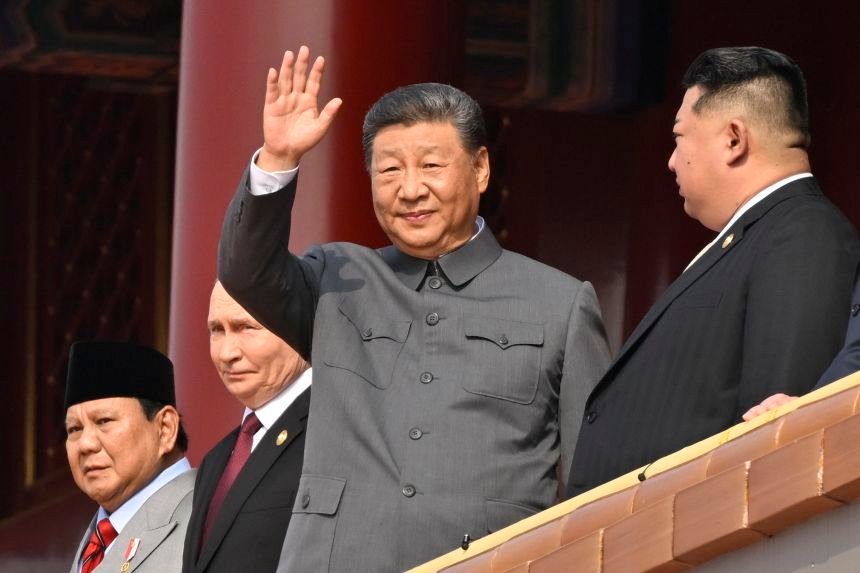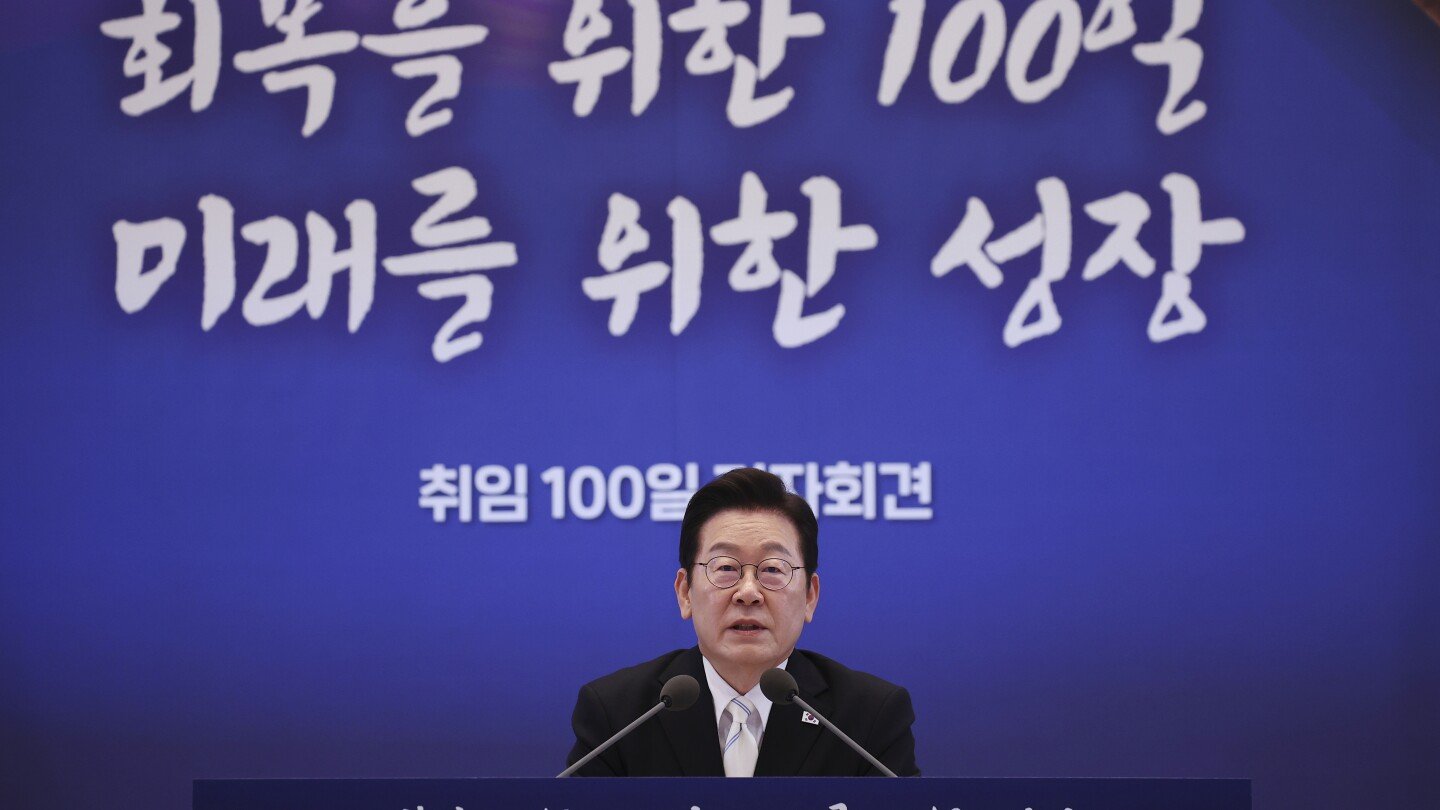Beijing
—
The optics could not have been more stark as Chinese leader Xi Jinping arrived at a massive military parade in Beijing flanked by Russian President Vladimir Putin and North Korean leader Kim Jong Un – with some two dozen other leaders including from Iran, Pakistan, Belarus and Myanmar trailing behind.
Jumbotrons at Tiananmen Square beamed the image to the 50,000 people gathered under the beating Beijing sun to witness the spectacle, many waving small Chinese flags, while state media transmitted it to televisions across China and the world.
Many watching in capitals across the West, including Donald Trump, thought the messaging was clear: China is deliberately provoking the US and its partners.
“Please give my warmest regards to Vladimir Putin, and Kim Jong Un, as you conspire against The United States of America,” the US president wrote to Xi on social media as legions of troops goose-stepped their way through central Beijing.
For anyone who heard the echoing shouts of the thousands of well-drilled troops and saw the hulking nuclear-capable missiles, underwater drones and warplanes gliding down Beijing’s Avenue of Eternal Peace, there’s no question that Xi was orchestrating his most forceful showing yet of China as an alternative global leader – with both military might and geopolitical heft.
China has long touted its “peaceful” rise and decried the “warmongering” US. But the parade, commemorating the end of World War II, was undoubtedly intended to telegraph the rapid advancement of the world’s largest military, and signal Xi’s growing ability to project hard power on the world stage.
A live mic that picked up Xi and Putin discussing how people may soon live to 150 through medical advances hinted at the durability both see for their own positions driving a global transition of power, as perhaps did Kim’s decision to bring his daughter and potential successor with him on his green train to Beijing.
Behind the carefully choreographed pomp was a key message – that Xi aims for a world where the US and the West don’t get to set the rules – and a question: what does that mean for the US and the world?
For Xi, setting Kim and Putin by his side was a forceful way to underscore his belief that the existing international system led by the US is to blame for current conflict and confrontation, not the men seated around him.
“Only when all countries and nations treat each other as equals, coexist in peace and support each other” can they “uphold common security” and “eradicate the root cause of war,” Xi said during a speech carried by loudspeaker across the parade grounds on Wednesday.
That root cause is “Cold War mentality, bloc confrontation and bullying practices,” Xi and his officials have said time and again, using Beijing’s code to describe American foreign policy.

Earlier in the week, in the port city of Tianjin, the Chinese leader closed a summit of regional leaders including Indian Prime Minister Narendra Modi by unveiling a “global governance initiative” – one pillar of Xi’s broader plan to reshape the way the international system is run and make it more “democratic.”
The plan, which supports the United Nations, could have broad reach, according to Wang Yiwei, director of the Institute of International Affairs at Renmin University in Beijing. “Global governance is not just focused on (security) but also finance – SWIFT system, sanctions, trade, AI governance, ocean governance, climate change … and we need to make the Global South have more say and power (at the UN),” Wang said.
Observers say Xi’s initiative is meant to both stand as a rallying point for countries that feel squeezed by an international system they see as unfairly dominated by the West – and help China dilute US power across a range of areas, by sharing it across more China-friendly countries.
That could help Beijing shape an international system where national development trumps any concept of individual human rights and no US-led alliance can hem in China’s ambitions. It’s an arrangement that could well benefit China’s designs on the island democracy of Taiwan, which Beijing claims and has not ruled out taking by force.
The one-two punch of Xi’s summitry followed by his parade over the past week appeared carefully calibrated to send a message: while China builds out its influence and soft power, it’s also growing the hard power that could back it if needed.
And even as China emphasizes that its military is for defensive purposes, its show of strength on Wednesday has given analysts around the world a clear look at the extent of its offensive capabilities and its vast capacity to produce arms.

The arsenal of missiles on show could enable China to strike targets across the world and evade advanced missile defenses with hypersonic technology; its vanguard of combat drones as well as laser weapons could also make it challenging for adversaries to block the advances of Chinese forces in the region in the event of an offensive.
And it was against a backdrop of this bristling display that Xi looked out into the crowds before him in Tiananmen Square and called on humanity to make a simple choice: “peace or war.”
There, Xi appeared to be referring to a choice of international system: China’s or the West’s.
And it’s a choice that he may now be more confident to ask countries to make, as Beijing watches Trump shake up America’s traditional role on the global stage by exiting international bodies, axing foreign aid, and roiling longstanding allies and partners with tariffs and other demands.
But it’s a statement that rings eerily for many observers when delivered alongside a show of military might attended by Putin, whose invasion of Ukraine sparked Europe’s bloodiest war since WWII, and Kim, who feeds him weapons and troops while building up his own illegal nuclear stockpile.
Chinese officials have long said China’s military is defensive, and took pains to describe their parade as commemorating China’s contributions to “safeguarding world peace.” Xi assured his spectators that China “remained committed to the path of peaceful development.”
But as Beijing hardens its ties with Russia, North Korea and other nations unfriendly to the West, the emergence of two camps and the contest between them appears clearer than ever.

Dismissing those ties between these countries would be “naive and dangerous,” said Edward Howell, a lecturer in politics at the University of Oxford in the United Kingdom, who focuses on the Korean Peninsula.
Their “common opposition to the US” allows for future, greater possibilities for “exchange in trade, weapons, and knowhow… for the broader goal of undermining the US-led international order,” he added.
And even as Beijing hopes to see a world where US alliances are broken apart, its own aggression in the region – as it asserts its territorial claims in the South China Sea and toward Taiwan – is driving American allies in Asia closer to Washington.
Meanwhile, as China faces its own challenges at home, where the ruling Communist Party is grappling with a slowing economy and persistent unemployment, some observers wonder whether drumming up nationalism as a distraction strategy could push China into an even more aggressive stance.
The parade on Wednesday “serves not only to demonstrate power abroad but also to rally nationalism at home and strengthen public support in face of economic headwinds,” said Tong Zhao, a senior fellow at the Carnegie Endowment of International Peace in the US. That helps Beijing in “shoring up internal stability to bolster China’s long-term rivalry with Washington,” he added.
And within the country, there are also those considering carefully where China’s military ambitions will lead.
Senior Col. (ret) Zhou Bo, a senior fellow at Tsinghua University’s Center for International Security and Strategy in Beijing, told CNN that he looked forward to China between now and 2049 becoming a so-called world-class military and still maintaining peace and continuing to rise.
“At that time, China’s aim is to be neck-to-neck with the US military. Then, of course, you have another dilemma: how can you prove that you have a world-class military without being combat tested?”























